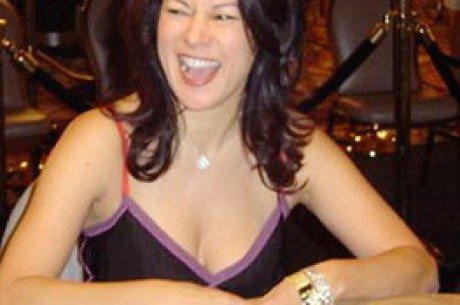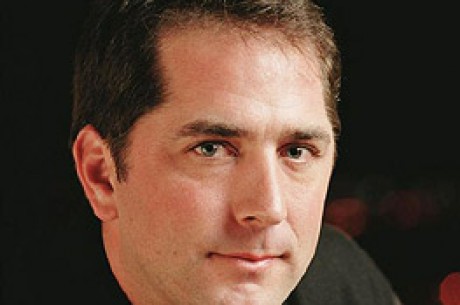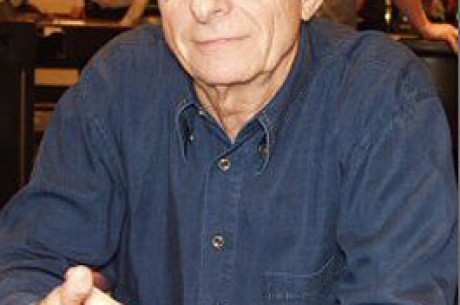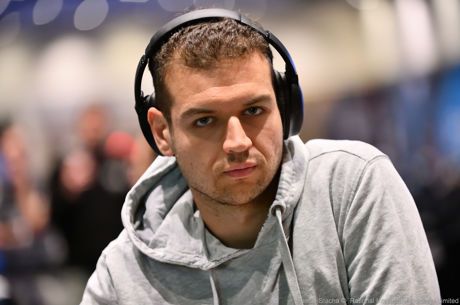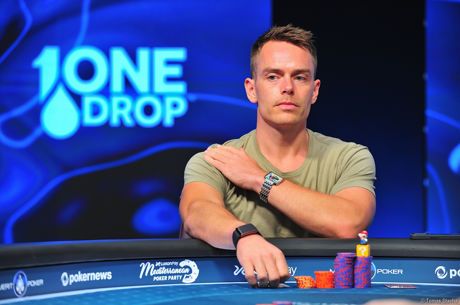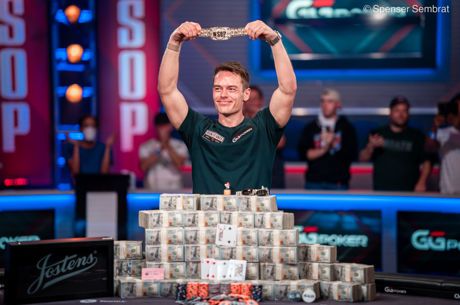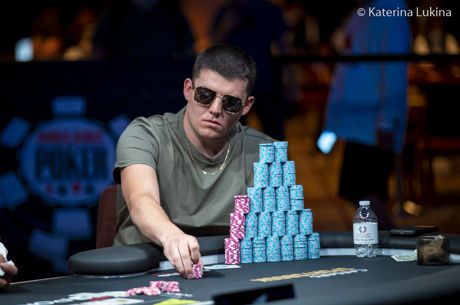Behind The
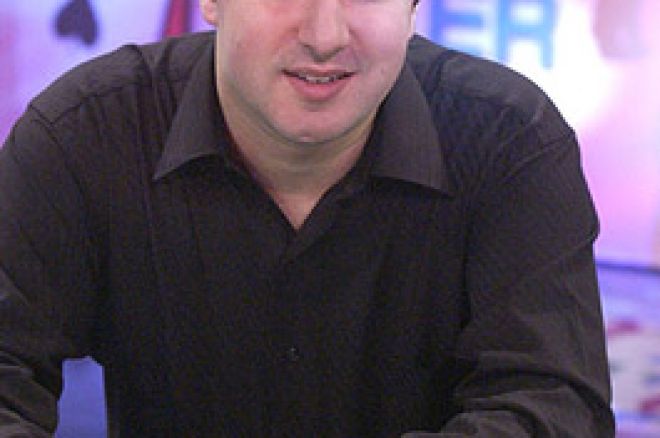
In the 2004 World Poker Tour Championship, Matt Matros made the step from the online game to being a force in the world of poker when he captured third place and the nearly three quarters of a million dollars that went along with it. It also allowed him to cap off his book, "The Making Of A Poker Player", with an epilogue that was worthy of the quality of the book. It was surely a sign that Matros was made for the game of poker!
Nowadays, Matt continues to play the game and advance his writing and education. While he hasn't quite made the same noise as he made in the 2004 WPT Championship, Matt has continued to play excellent tournament poker and write quite a bit about the game on his website, mattmatros.com, which contains excellent insight to playing the game. I had the opportunity to correspond with Matt via E-mail recently to talk about his book and his thoughts on the game.
PN: Was there anything you left out of "The Making Of A Poker Player" that you really wish you had gotten in the book?
MM: Wow, that's a good question, and one that I've never been asked! I think "Making" is fine as is. I mean, it's pretty thick already (although most say it's a fast read) and I feel I couldn't really add much without changing the nature of the book. It's not supposed to be an advanced strategy book, or an overly descriptive narrative. It's a strategy book told through a narrative that aims to be useful for players of all skill levels. Beginners can learn a lot from it, and experienced players can enjoy reliving their own poker education through the stories of another player.
PN: It seemed to me, when I was reading the book, that it has been something that you have had in mind since you were young. Was it something you consciously did or was it a nice event in your life that came along?
MM: It took about three years for the book to get from the idea stage to the finished manuscript stage. Over that time, I had many opportunities to think about what parts of my poker life I wanted to include and what parts I wanted to leave out. But when I was young, I had no idea I'd ever play poker well enough to win at it, so I can't say it was in my head from those early days.
PN: How much did playing while you were younger influence your game now?
MM: Honestly, not that much. I played when I was younger because I really enjoyed the game and found it fascinating, but I had no idea how to play the game well. The mistakes I made back then were so basic that I can't say any of my current strategy is the result of insight I had as a kid. That's because I had no insight as a kid!
PN: How important was it for you to continue to get your education while you played?
MM: When I was in college, and again when I was in grad school, my education was the most important thing in my life. I more or less fell into becoming a professional poker player when graduate school ended. Poker is how I pay the bills, but I'm trying to move towards becoming a full-time fiction writer eventually.
PN: Do you play the game more from a mathematical approach or do you go more by "feel"?
MM: I think the two are intimately related. Translating your "feel" into mathematics is something that would benefit every player, in my opinion. Lately I've been trying to figure out just how good my instinct is, in terms of numbers. It's not an easy task, and I still don't think I have a handle on it.
PN: You present some very solid strategies in "Making", and in several games. Do you consider yourself an all-around player or is there some you are better at than others?
MM: Limit Hold 'Em is definitely my best game, followed closely by No Limit and Pot Limit Hold 'Em. Then there's a significant drop off, but my next best game is Omaha Eight-or-better. After that, while I'm not a fish in any game, I certainly don't consider myself a strong player (one that could win consistently in higher limit games) in anything else, although I'm working to change that.
PN: Who were some influential players on your style?
MM: Andy Bloch, Russell Rosenblum, Bill Chen, Jerrod Ankenman, Chris Ferguson and Howard Lederer, to name a few. Those are six guys who, for each of them, I can immediately think of something they said at one time or another that still influences the way I play today.
PN: How can a home game player improve their game to the level to be able to play tournament poker?
MM: In most home games, the players play far too many hands and do far too much calling when they should be raising or folding. A good way for a home game player to improve is to make his home game more serious-either by raising the stakes, or recruiting more interested players. Another approach is to branch out from the home game and try low limit poker online, or in a casino. Finally, reading about poker is almost always a reliable way to help out someone's game, if only because it makes the player think about poker a little more.
PN: What is a more challenging atmosphere, tournaments or ring games?
MM: Tournaments are usually more challenging because you're often facing some of the best players in the world. In ring games you try to seek out the fish and win money from them. Ring games are good for business, but tournaments are more interesting.
PN: What advise would you give to those players who want to move into the tournament poker world?
MM: I wouldn't recommend entering tournament poker until you've proven to yourself that you're a consistent winner at cash games. Also, don't read too much into a few tournament failures or successes.
PN: How has online poker helped or hurt your game?
MM: Online poker has given me the opportunity to log a lot of hours playing poker, and to play a lot of tournaments. This allowed me to get a lot more experience than I could've received playing strictly brick-and-mortar poker. Occasionally, I get into bad habits in brick-and-mortar games (miscounting the pot, misremembering my hand) because I'm so used to playing online. But usually once I play brick-and-mortar for a few days the rust wears off.
PN: Where do you play online?
MM: I play at almost all the major online card rooms, including PokerStars and PartyPoker.
PN: What are the basic differences you see between online and live poker?
MM: Players are looser and more aggressive online, in general. Also, the game plays a lot faster so it requires quicker thinking.
PN: What errors do you see online players make more often than in a live game?
MM: They generally bluff too much but, then again, most brick-and-mortar players don't bluff enough.
PN: What opinion do you have of the different "message boards" that discuss poker strategy?
MM: I think message boards are great. I learned a lot from them when I was first learning the game. These days I mostly contribute to wptfan.com, but I occasionally stop by RGP and 2+2.
PN: What does your schedule look like for the rest of 2005?
MM: The World Championship of Online Poker is coming up on PokerStars. Then I have the Borgata Poker Open, the World Poker Finals at Foxwoods, the World Series of Poker Circuit event at the Showboat in Atlantic City, and the Trump Taj Classic.
PN: How does being on the East Coast affect your plans to play in tournaments?
MM: It means I have to travel a lot, and I don't play as many tournaments as the West Coast players do. Luckily, there are a bunch of tournament on the East Coast at the end of the year.
PN: Do you consider yourself a full-time professional or is that something you aspire to?
MM: I'm not a full-time pro, I'm a writer/poker player, even though more than 95% of my income is from poker. I aspire to be a full-time writer.
PN: Are there any other projects that we can look forward to from you?
MM: I cowrote Erick Lindgren's No Limit Hold 'Em strategy book, which is coming out later this year. (Writer's note: I have a copy of this book and it looks excellent! Look for a review forthcoming on it!)
PN: What can people expect to find on your website?
MM: MattMatros.com is a site dedicated to discussing poker strategy through experience. It has polls on how to play hands, strategy articles I've written, and a poker journal that I constantly update.
PN: How do you get away from the game of poker?
MM: I write fiction. I watch sports. I watch bad TV. I read. I play golf (once in a while) and basketball (even less often). I go out with my girlfriend Ivy.
PN: Finally, Matt, you are primed to be an influence on the game of poker, with your youth and experience putting you in that position. What are some things that you would like to see happen in the world of poker?
MM: I'd like to see the players not have to pay juice for televised events. Then I'd like to see it go one step further and have sponsors add money to televised events. The Professional Poker Tour has started to get the ball rolling on this, but there is much still to be done. I'd also like to see a crackdown on collusion, less immature behavior at the tables, and poker broadcasts that include more of the poker and fewer of the player bios.
I want to thank Matt for taking some time out of his preparations for the fall poker schedule to talk to me. He is definitely one of the great young players in the game today and, if you haven't read "The Making Of A Poker Player", I encourage you to pick it up and add it to your poker library! If you can't devote the time to reading his book, you can pick up on many of his theories on the game of poker by visiting mattmatros.com and reading over his well written strategy articles there.

